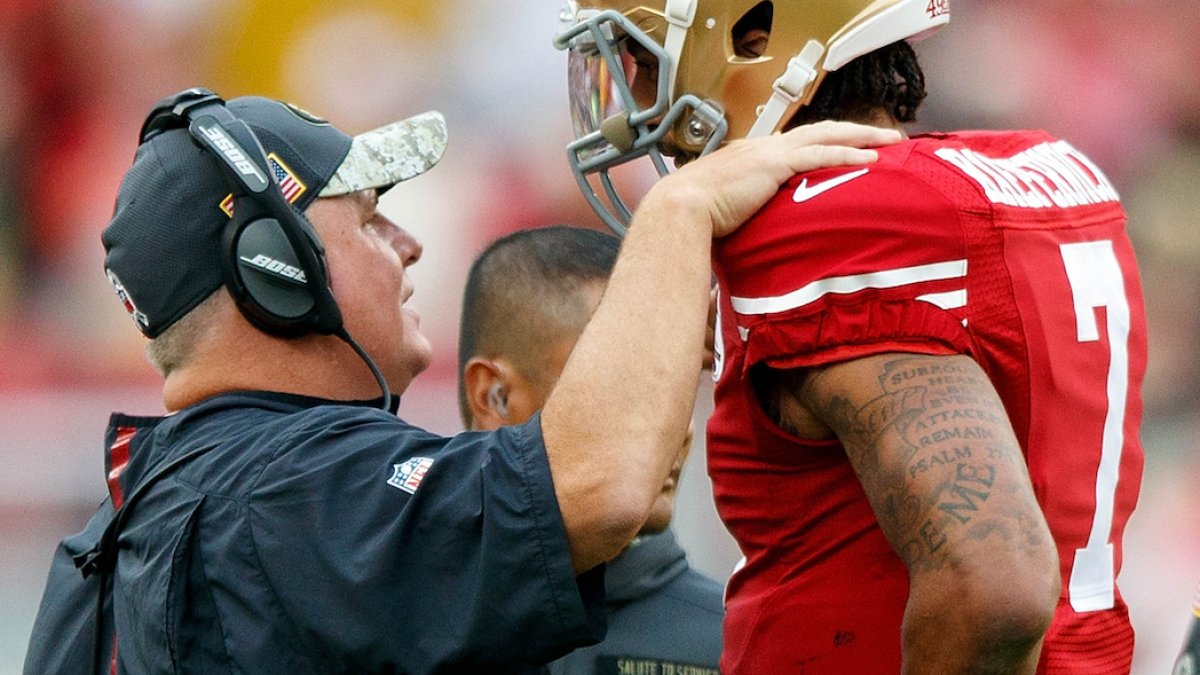In the 2016 offseason, I wrote about how the biggest acquisition made by San Francisco was the hiring of head coach Chip Kelly and his up-tempo, no-huddle style offense. When he took over the Philadelphia Eagles, he inherited an offense that ranked 30th in PFF's cumulative grades, and turned it into the third-best offense in his very first season. Much of that can be chalked up to a talented Philadelphia unit not playing to its fullest potential in 2012, as well as Kelly taking the NFL by storm as defenses struggled to quickly adapt to his schemes and speed.
Once NFL defensive coordinators had enough film on Kelly’s system, however, it struggled to maintain its high level of play, and eventually became fairly easy to stop, leading to the head coach's firing in Philadelphia (along with several questionable personnel moves). 49ers GM Trent Baalke had fired the team’s most successful head coach since Bill Walsh a year prior, and the Jim Tomsula era lasted all of one season before Baalke brought in Kelly, hoping to ignite a San Francisco offense that ranked 31st in PFF's grades.
Clearly, Chip Kelly’s system isn’t suited to taking inferior offensive talent and turning it into a sum that is better than it’s parts, as the 49ers' offensive unit currently ranks 31st in PFF grades once again. While Kelly should be given more time to coach his players and be allowed to adapt his schemes—he has added some wrinkles in his run game, with the addition of the pistol helping to lead to the fourth-ranked rushing attack in yards per game (126.5)—the 49ers needs some serious offensive talent, starting at quarterback.
Building through the draft
While it’s uncertain exactly where the 49ers will draft come April, they’re currently slated to pick second; one Cleveland Browns victory, however, would boost them to first, based on strength of schedule at the time of this writing. The 49ers' remaining opponents include the Chicago Bears and New York Jets, so losses to those teams would only weaken their strength of schedule and tighten their lead there. Regardless, they’re on track to pick in the top three, and now sit at No. 2, so I will focus on what they can do with the second overall pick.
Senior Analyst Steve Palazzolo slated Texas A&M superstar DE Myles Garrett to the 49ers in his most recent mock draft, with the Browns selecting Alabama DT Jonathan Allen at No. 1. Either player would immediately be an upgrade to a 49ers' defense that currently ranks 30th in our NFL Power Rankings entering Week 13. Garrett has consistently graded as one of the best edge defenders in the nation the past three seasons, and took his play to another level in 2016 with good production in the run game, despite playing through injury. Allen, on the other hand, would help a defensive line that lacks depth after losing Ian Williams to injury; he currently grades out as the best college interior defender in the nation, and is easily the best player on an extremely talented Alabama defense.
If Baalke decides to select an offensive player at the No. 2 spot, the picture becomes much less clear. All of the top touted quarterbacks for the 2017 NFL draft are underclassmen and haven’t established themselves as sure-fire, top-five draft talent. Clemson’s Deshaun Watson was slated to the Bears at No. 3 in the mock draft, but his disappointing 2016 season is pause for concern—although he put on a passing clinic against South Carolina State this past weekend.
Other choices at QB are North Carolina’s Mitch Trubisky, Notre Dame’s DeShone Kizer, and Oklahoma State’s Mason Rudolph. It’s clear that Colin Kaepernick and Blaine Gabbert aren’t the long-term answers for Chip Kelly’s system, even if Kaepernick brings a dynamic running ability that was much-needed for the team. Kaepernick has played better in recent weeks, but his four-year level of play since his Super Bowl run leaves him with a track record of poor performance and shouldn’t inspire confidence.
Frankly, the team has a lot of holes at this time, needing upgrades at nearly every position; trading back to acquire extra picks this draft may be a good strategy. Rookie DeForest Buckner has played well in spurts, but his weakness at taking on double-team blocks is a big concern in the NFL. Guard Joshua Garnett has recorded a below-average rookie season, but should continue to improve with more experience, and has graded positively in run blocking. CB Rashard Robinson has shown flashes of dominant play, and could develop into a fourth-round steal.
Baalke is a good talent evaluator, and has drafted some very good NFL players, but a coaching carousel has simply set this team back. Bringing LB Gerald Hodges from Minnesota was a good move, as he grades as one of the better defenders on the team, and CB Tramaine Brock has played consistently well, despite not recording an interception this year, but ranking sixth in pass breakups. RB Carlos Hyde has talent, but can’t seem to stay healthy for an extended period, so even his position should be questioned.
There will be talent for hire via free agency, but if the last year few offseasons are any indication, Baalke won’t go after it, opting to build through the draft—which is a good strategy. The team was depleted by several unexpected retirees, and will take time to rebuild. Many will blame Kelly’s system for this season's struggles, but the team simply lacks the talent to win consistently right now. The head coach's system does put undue stress on his defense, but if the talent is there, it doesn't matter as much. The team has played better the past three games, so there is a seemingly upward trajectory in place, but the key for the San Francisco 49ers moving forward is to hit on their picks in the 2017 NFL draft.



 © 2024 PFF - all rights reserved.
© 2024 PFF - all rights reserved.